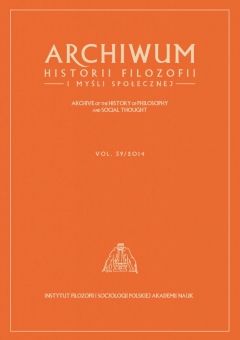Rickert i Heidegger
Rickert and Heidegger
Author(s): Daniel Roland SobotaSubject(s): Epistemology, Philosophy of Science
Published by: Instytut Filozofii i Socjologii Polskiej Akademii Nauk
Keywords: Heidegger; Rickert; neo-Kantianism; epistemology; philosophy of science; being; negation; question;
Summary/Abstract: The purpose of this article is to compare selected topics of H. Rickert’s and M. Heidegger’s philosophy. Despite the large literature on each of these thinkers their philosophical interrelations are poorly known. Most often, those who study the influences of early Heidegger, ignore the impact of Rickert. This situation can be explained by a few reasons. In the first part I recall some facts and statements of philosophers that provide an insight into the relationship between them. In the second part I present the main theses of Rickert’s epistemology. Then I compare them with the thought of Heidegger. I leave aside the question of the possible presence of thinking in terms of values in the philosophy of Heidegger. Instead, I focus on certain decisions of a methodological nature. The results are as follows: Rickert builds his epistemology based on the phenomena that are philosophically „doubtful”, namely, problems of question or negation, petitio principii error, error of empirical nature. Heidegger follows exactly the same path. Thus, Rickert’s philosophy may be viewed as the one that opened new possibilities for the understanding of being and knowledge.
Journal: Archiwum Historii Filozofii i Myśli Społecznej
- Issue Year: 59/2014
- Issue No: 59
- Page Range: 263-289
- Page Count: 27
- Language: Polish

